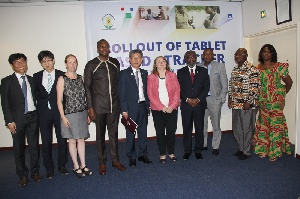The Ghana Health Service (GHS) has taken delivery of 2,590 Samsung Android tablets, which have special inbuilt e-tracking software devices to support the digitisation of Ghana’s District Health Information Management System (DHIMS-2).
Dr Anthony Nsiah-Asare, the Director-General of the Ghana Health Service (GHS), who received the devices from Samsung Electronics in Accra on Thursday, said they would be deployed in all functional Community-Based Health Planning and Services (CHPS) zones in the Upper East, Volta and Eastern regions.
He said the facility would be very useful to frontline health workers in capturing and processing of all data, ensure accuracy and timeliness in informing policy decisions and aiding in budgeting.
Dr Nsiah-Asare explained that the “Rollout of Tablet-Based e-Tracker” was a partnership drive between the GHS, the United States Agency for International Development (USAID), Korean International Cooperation Agency (KOICA), Samsung, Evaluate for Health, and Good Neighbours.
He said the ‘Tracker-Capture,’ implemented by the GHS as a core part of the DHIS-2 suite of Android apps, provided offline alternatives to its traditional online web-based data capture and reporting tools.
This, he said, sought to change the paradigm by moving away from manual register to real-time tablet-based digital registry and, over time, this transition would strengthen planning initiatives at the central level, enable tailored supervision and management at the district level, and reduce inefficiencies in data capture.
Dr Nsiah-Asare said the GHS’s vision was to use modern information technology to address some of the bottlenecks in the health sector as a whole, facilitate information sharing across the continuum of care, ensure evidenced-based management decision making, especially at the lowest level of health services, and promote transparency and ensure accountability.
He thanked all the partners and hoped the donation would be the beginning of similar others to support an expansion of the project to other regions to completely replace the paper-based reporting systems.
Ms Melinda Tabler-Stone, the Acting Chief of Mission at the US Embassy, however, stated that to fully achieve President Nana Akufo-Addo’s “Ghana beyond Aid,” there was the need to strengthen information systems for informed decision-making; improve partner coordination, and build country ownership.
“Similarly, the US Government is increasingly focusing on activities, which build on local capacity and ownership,” she said, adding that better management of health data would lead to improved response at the national level in addressing potential emergencies and epidemics.
This would enable the Government to invest in resources wisely and help facilitate long-term social and economic development.
Mr Sungsoo Kim, the Korean Ambassador to Ghana, expressed his gratitude to all the partners for making the e-Tracker initiative a reality that would go a long way to improve universal health coverage.
Mr Kelvin Ntiamoah Sarpong, the Head of Mobile at Samsung Electronics, said the project fell under the company’s Corporate Citizenship Initiative, as it believed in using technology to enhance lives.
It is also to help train front-line health workers to enter data accurately with consistency using the tablet PCs to help improve the country’s system.
The app, he said, supported the tracking of persons, captured information while being offline and uploaded to the server when connectivity was restored.
It also supports search and listing of people and upcoming events, among other things.
Health News of Thursday, 1 February 2018
Source: ghananewsagency.org

















